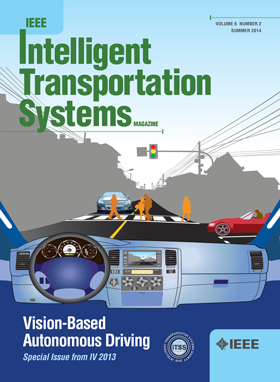V2VDisCS: Vehicle to Vehicle Distributed Charge Sharing in Intelligent Transportation Systems
IF 7.9
1区 工程技术
Q1 ENGINEERING, CIVIL
IEEE Transactions on Intelligent Transportation Systems
Pub Date : 2025-02-04
DOI:10.1109/TITS.2025.3534025
引用次数: 0
Abstract
Electric Vehicles (EVs) have become popular in the domain of Intelligent Transportation Systems for their ability to mitigate increasing environmental concerns by reducing carbon footprints and conserving fossil fuels. Due to the scarcity of static charging stations, Vehicle-to-Vehicle (V2V) charge sharing can facilitate the on-demand charging requirement of EVs. However, most of the V2V charge-sharing solutions are either centralized or semi-centralized, causing long waiting times, huge message overhead, and high infrastructural costs. For a large network, assigning a suitable donor EV for an acceptor EV as well as maximizing the matching cardinality in a distributed environment is a challenging problem. In this paper, the problem of V2V matching for charge sharing is mapped to the classical stable matching problem in bipartite graphs. The problem is formulated using integer linear programming that considers flexible decision making for EVs based on multiple charging criteria and constraints. However, as EVs have limited communication ranges, an EV can’t possess knowledge about the entire vehicular network. So we propose two sets of distributed heuristics under the name of Vehicle to Vehicle Distributed Charge Sharing (V2VDisCS), which yield a sub-optimal solution with lower computational and message complexities compared to existing distributed solutions. We analyze the average case matching probabilities and prove the sub-optimality of our approach. Simulation studies show that our heuristics outperform the existing distributed approaches in terms of message overhead and matching percentage. They show a comparable result for matching preference with respect to the standard centralized stable matching algorithm.v2vdisc:智能交通系统中的车对车分布式收费共享
电动汽车(ev)因其能够通过减少碳足迹和节约化石燃料来缓解日益严重的环境问题而在智能交通系统领域受到欢迎。由于静态充电站的稀缺性,车对车(V2V)充电共享可以满足电动汽车的按需充电需求。然而,大多数V2V收费共享解决方案要么是集中式的,要么是半集中式的,这导致了漫长的等待时间、巨大的消息开销和高昂的基础设施成本。对于一个大型网络,在分布式环境下,为一个供体EV分配一个合适的供体EV以及最大化匹配基数是一个具有挑战性的问题。本文将电荷共享的V2V匹配问题映射为二部图中的经典稳定匹配问题。该问题采用整数线性规划的方法,考虑了电动汽车基于多种充电标准和约束条件的柔性决策。然而,由于电动汽车的通信范围有限,电动汽车无法掌握整个汽车网络的信息。因此,我们提出了两组分布式启发式算法,命名为车辆到车辆分布式费用共享(v2vdisc),与现有的分布式解决方案相比,它们产生了一个计算和消息复杂性较低的次优解决方案。我们分析了平均匹配概率,并证明了该方法的次优性。仿真研究表明,我们的启发式算法在消息开销和匹配百分比方面优于现有的分布式方法。它们显示了相对于标准集中式稳定匹配算法的匹配偏好的可比结果。
本文章由计算机程序翻译,如有差异,请以英文原文为准。
求助全文
约1分钟内获得全文
求助全文
来源期刊

IEEE Transactions on Intelligent Transportation Systems
工程技术-工程:电子与电气
CiteScore
14.80
自引率
12.90%
发文量
1872
审稿时长
7.5 months
期刊介绍:
The theoretical, experimental and operational aspects of electrical and electronics engineering and information technologies as applied to Intelligent Transportation Systems (ITS). Intelligent Transportation Systems are defined as those systems utilizing synergistic technologies and systems engineering concepts to develop and improve transportation systems of all kinds. The scope of this interdisciplinary activity includes the promotion, consolidation and coordination of ITS technical activities among IEEE entities, and providing a focus for cooperative activities, both internally and externally.
 求助内容:
求助内容: 应助结果提醒方式:
应助结果提醒方式:


